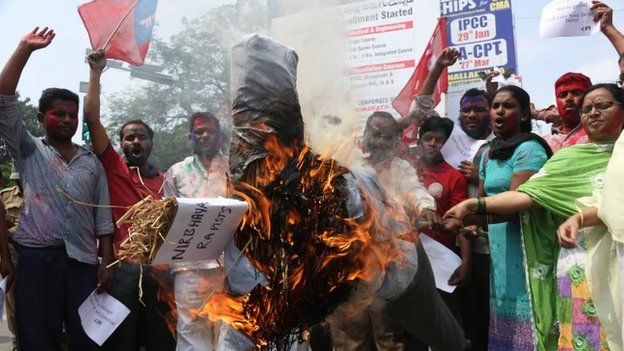How Indians are evading ban on rape documentary
- Published

The Indian government banned a documentary earlier in the week that featured an interview with a man facing the death sentence over the gang-rape and killing of a student in Delhi in 2012.
The authorities said the interview contained offensive remarks towards women, and could cause a public outcry.
However, many thousands of Indians have managed to access the film online.
The story once again illustrates the difficulty of banning films in the internet era.
How the authorities enforce the ban
The Delhi court's ruling prevents "the media/internet from publishing/transmitting/telecasting/uploading the interview".
Most Indian papers and TV channels have respected the ban, even to the extent of not quoting from the rapist's interview.
But the BBC showed the film on a UK-based channel, BBC Four, and since then people around the world have been sharing and uploading the film.
YouTube issued a statement on Thursday confirming it had taken down one address that linked to the documentary.
Users trying to watch the film were told: "The content is not available on this country domain due to a court order."
But Indians were still able to see the film on YouTube because, as one account is blocked, another springs up.
YouTube only removes content if the material infringes the law, and it receives a request referring to a specific web address.
In addition to the court's ban, the production company that made the film also said it was attempting to get illegal uploads removed.
Some uploads of the video on YouTube were replaced with the message: "This video contains content from the BBC, who has blocked it on copyright grounds."
How Indians have dodged the ban
The video has not only been uploaded to YouTube, but also to many other websites, making it even harder for the authorities to enforce a ban.
One website openly addresses the issue, telling users: "We implore you to see it and decide for yourself how you feel about it. The government cannot take this decision for you."
The page, which has a YouTube version of the video embedded, was shared more than 40,000 times on Twitter and Facebook.
Although YouTube has successfully taken down a number of the uploads, including the ones that these sites pointed to, many thousands of Indians have already circumvented the ban.
Many have used the standard technology tool that circumvents country-specific bans: using a proxy server to disguise the location of their computers.
Others have also downloaded the film and shared with friends and family on USB sticks or CDs.
The difficulties of blocking content
If you want to know how hard it is to stop people copying and sharing content online, ask the music and film industry, writes the BBC's Mark Ward.
For over a decade industry associations for both sectors have sought ways to stop music and movies being pirated online. They have spent millions on investigations, launched countless lawsuits and deployed all kinds of sophisticated copy-spotting technology. For example, at the end of last year Google was getting more than nine million requests a week from rights holders to remove links to supposedly infringing content. Despite this, pirated content is still easy to find online.
The problem facing rights holders is the mismatch between the time it takes to copy a file and how long is needed to make a website, social network or online forum take down a pirated track or stolen movie. Copying can be as quick as a mouse click but take-down notices can take hours, days or months to enforce. Small wonder then that copying is rampant and sites such as The Pirate Bay have defied all attempts to knock them offline.
The proliferation of smartphones, social media and instant messaging systems are only making it easier to share links to content at the same time as they make it harder to spot when copyright is being flouted and media shared.
- Published5 March 2015
- Published5 March 2015
- Published5 March 2015
- Published5 March 2015
- Published4 March 2015
- Published4 March 2015